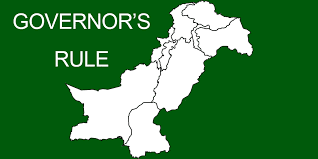What is the constitutional process to impose Governor's rule in a province?
Presidential powers have drastically been curtailed to impose governor's rule in the 18th amendment to the constitution
Interior Minister Sheikh Rashid has again come up with an idea to impose Governor’s rule in Sindh. He has given this proposal to the PM Imran Khan in a recent meeting. Sheikh Rashid thinks that Sindh government is involved in a conspiracy against the democratic government of PM Imran Khan. For him, this reason is enough to remove a democratic government in Sindh and to impose governor’s rule.
The federal government is accusing the Sindh government for sheltering the disgruntled PTI MNAs in Sindh House. This is not the first time that the idea to impose Governor’s rule has been floated. This idea has been floated on several occasions in the past.
When JIT
(Joint Investigation Team) leveled serious charges of money laundering and corruption
against former president Asif Zardari and his sister Farayal Talpur, many
federal ministers raised the idea of Governor’s rule in Sindh at that time.
In this
situation, it is important to know what 1973 constitution says about the Governor’s
rule in a province. What is the process to impose the Governor’s rule under the
1973 constitution?
Under the 18th amendment, Parliament
and the concerned provincial assembly have vast powers to constrain it. The
constitution clearly laid down the conditions in which Governor’s rule could be
imposed. The president hasn’t given unconditional powers to impose Governor’s
or presidential rule in a province.
Clause 1 of
Article 232 says if the president is satisfied that a grave emergency exists in
which the security of Pakistan, or any part thereof, is threatened by war or
external aggression, or by internal disturbance beyond the power of a
provincial government to control, he may issue a proclamation of emergency.
But a
proviso makes it clear that for imposition of emergency due to internal
disturbances beyond the powers of a provincial government to control, a
resolution from the provincial assembly concerned shall be required.
In the
instant case, the Sindh Assembly is unlikely to approve such a proclamation
because the PPP has clear majority in the house. PPP has 99 MPAs in the Sindh
assembly while combine strength of opposition parties is 69 MPAs. In this
situation it is impossible for the federal government to pass a resolution to
impose the Governor’s rule from Sindh assembly without major defections in the
ruling PPP. A reading of the proviso
shows that a resolution has to be passed by the provincial assembly before the
issuance of such proclamation.
The second
proviso says if the president acts on his own, the proclamation of emergency
shall be placed before both the Houses of Parliament for approval by each
chamber within 10 days. Its passage from both the Houses is mandatory as the
word “shall” has been used in the proviso.
However,
every such order made under this Article shall be laid before both Houses of
Parliament separately for approval. Here again, parliament has been empowered. The
president’s power to issue proclamation in case of failure of constitutional machinery
in a province has been covered under a different provision.
Article 234
says if the president, on receipt of a report from the governor of a province,
is satisfied that a situation has arisen in which the government of the
province cannot be carried on in accordance with the provisions of the
constitution, he may, or if a resolution in this behalf is passed by each House
separately shall, by proclamation assume to himself, or direct the governor of
the province to assume on behalf of the president, all or any of the functions
of the Government of the Province, and all or any of the powers vested in, or
exercisable by, anybody or authority in the province, other than the provincial
assembly.
Under the
present circumstances, the PTI government has lost the majority in the national
assembly to pass such resolution required under the constitution. Opposition
parties have the majority in Senate to defeat any resolution in this regard.
The government seems not in a position to pass the resolution from the joint
sitting of the parliament.
Such a
proclamation shall be laid before a joint sitting and shall cease to be in
force at the expiration of two months unless before the expiration of that
period it has been approved by resolution of the joint session and may by like
resolution be extended for a further period not exceeding two months at a time;
but it shall not in any case remain in force for more than six months.
Khalid Bhatti














Post a Comment